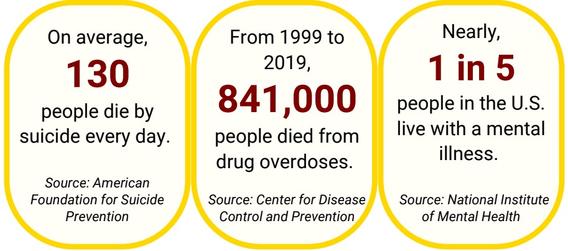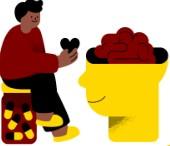What is Mental Health First Aid? (MHFA)
Mental Health First Aid (MHFA) teaches participants how to identify, understand and respond to signs of mental illness and substance use disorders among adults.
The U of M College of Pharmacy is currently supporting Adult Mental Health First Aid classes. These are intended to better equip adults in helping those in their community who may be experiencing a mental health crisis or substance use disorder.
Why train in MHFA?
Peer-reviewed studies have been conducted around the world and show that individuals trained in the program:
1. Grow their knowledge of signs, symptoms and risk factors of mental illnesses and addictions.
2. Can identify multiple types of professional and self-help resources for individuals with a mental health or substance use challenge.
3. Increase their confidence in and likelihood to help an individual in distress.
4. Show increased mental wellness themselves.
5. This course qualifies as 5.5 CE credit hours by the Minnesota Board of Pharmacy.
6. This course qualifies as an Honors Program Project for UMN PharmD Class of 2024 and 2025 students.

College of Pharmacy provides Mental Health First Aid Trainings that is 100% Virtual, with flexibility top of mind.
By the end of the training, learners will:
- Identify the impact of mental health and substance use challenges on the wellbeing of American adults.
- Describe the principles of safety and privacy for both the mental health first aider and the person receiving first aid.
- Explain the five steps of the Mental Health First Aid Action Plan.
- Recognize the signs and symptoms of mental health challenges that may impact adults.
- Evaluate the impact of early intervention on mental health and substance use challenges.
- Apply the appropriate steps of the Mental Health First Aid Action Plan to a non-crisis or crisis scenario.
- Choose appropriate methods for self-care following the application of Mental Health First Aid in a crisis or non-crisis situation.

MHFA Virtual Training Dates
Summer 2024
- Saturday, June 22
- Thursday, June 27
- Friday, July 26
CoP MHFA Contacts
Jamie Larson, MHFA Coordinator - jamiel@umn.edu
Laylia Yang, PharmD Student and MHFA Coordinator - yang5653@umn.edu
Chenwei Yan, PharmD Student and MHFA Coordinator - yan00052@umn.edu